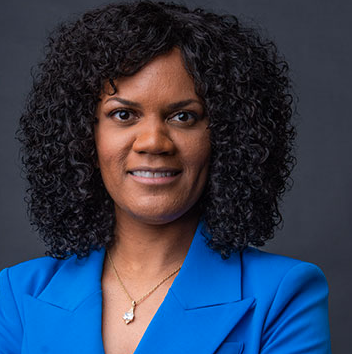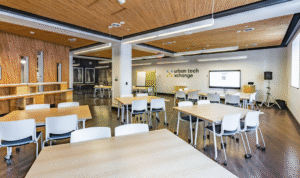
- Kim Kisner
- Community
- 06/20/2023
Councilwoman Latisha Johnson: Residents Need to Benefit from Businesses Coming into Detroit

Detroit native and Councilwoman Latisha Johnson has been active in the community for 15 years and represents Detroit City Council District 4 on the east side of the city bordering Harper Woods and Grosse Pointe, a community she’s lived in most of her life.
She attended Detroit Public Schools and graduated from the University of Michigan- Dearborn, where she earned a degree in finance. She began her career in Detroit’s tourism industry, marketing the city to visitors to attract spending within the local economy.
Johnson began her public service in 2007 when she became vice president of the East English Village Neighborhood Association. During her tenure, she led efforts to eliminate blight, hold financial institutions accountable, and prevent residential property tax foreclosures.
In 2014, she founded MECCA Development Corp. to address concerns of well-being, workforce development, youth engagement, and neighborhood revitalization.
She has also has served as treasurer for the 5th Precinct Police/Community Relations Council, vice chair of the City of Detroit’s Board of Zoning Appeals; member of the Wayne Metro Community Action Agency Regional Advisory Council, and was a volunteer with Wayne State University’s AmeriCorps Urban Safety Program.
SBN Detroit spoke to Johnson about her sustainability goals and about how residential development and business development go hand in hand.
Q: What are your primary goals for sustainability in the city?
A: One key thing is the evaluation of our internal processes. I co-chair the Small Business Task Force with two council colleagues, Mary Waters, and Angela Whitfield-Calloway. Our focus is to ensure that our requirements and practices for small businesses to bid on projects are not insurmountable.
One example that came to light just recently: We had a contract come before us, and our procurement team had to make calls to companies to encourage them to bid. In a healthier environment, we should have contractors knocking on our door to bid on projects. This showed us that a lot of companies are overwhelmed by our processes. Small businesses just don’t have the resources to navigate them, so we are now trying to streamline the system and reduce paperwork and red tape.
We want to find ways to help grow small businesses, particularly in the neighborhoods of Detroit.
Q: In 2014, you founded MECCA Development Corp. to address concerns of well-being, workforce development, youth engagement, and neighborhood revitalization. How does this work impact and inform your role as a councilwoman?
A: It definitely impacts what I do now. MECCA had four areas of focus: workforce development; residential development; seniors; and youth. The area I became passionate about – especially as we saw property values climbing – was and is residential development. Houses have become unattainable for lower-income families in this climate. Too many people cannot afford the down payments and can’t qualify for loans.
Now I’m hyperfocused on affordable home ownership. This also comes from who I am as a Detroit native who grew up in a lower-income household. I have firsthand experience with these challenges. Therefore, I’m working on programs and opportunities to assist. We recently started a Down Payment Assistance Program to provide up to $25,000 for lower-income renters who want to purchase a house in the city.
I’m also working on getting the city of Detroit to support Community Land Trusts. I recently worked with a group of students from the University of Michigan to understand how split-rate taxes (which tax vacant land at a higher rate than structures and improvements) would impact Detroit homeowners.
I also established the Equitable Development Task Force, which focuses on addressing underserved communities through policies and programs that reduce disparities while fostering places that are healthy and vibrant. The task force may include residents, representatives from the community, labor, the business sector, as well as any other individuals interested in participating.
So yes, MECCA helped shape and inform the work I do around housing and home ownership. I’m always striving to find ways to provide support to low-income families.
Q: How do you think residential development impacts businesses in Detroit?
A: When I look at our district, the areas that have benefited from the Strategic Neighborhood Fund – Jefferson, East Warren, and now Gratiot – are the areas in which residential properties have also stabilized. So, we know that revitalizing commercial corridors helps stabilize residential, and vice versa. More businesses will come into these areas – it’s cyclical.
I’d also like to see people having the opportunity to build equity in their homes that they can pull out to start their own businesses and build generational wealth. It all connects.
Years ago, when I worked at Detroit Convention and Visitors Bureau, and we hosted site inspections, we had to craft the routes to prevent taking clients through blighted commercial corridors. When commercial corridors look a certain way, it gives the impression that the neighborhoods are even worse.
So, we need more of a focus on both housing and commercial corridors to become stabilized, and they depend on one another to do so.
Q: What are the biggest challenges you face?
A: First, the tax rate in Detroit. It’s a challenge for residents and businesses.
Second, is the lack of promotion of our neighborhoods and commercial corridors to encourage businesses to establish there. No entity proactively promotes and connects entrepreneurs to these communities. There is a big opportunity there.
Q: What are other opportunities for the city, and how will these affect businesses?
A: As I mentioned earlier, there is an opportunity to streamline the city’s internal processes so that smaller businesses can bid on and secure projects.
Another opportunity is the promotion of harmonious growth between business communities and residential communities. We have not done that well. I think businesses and communities can work together better to support one another. When a business does this, it will inherently last longer in the community
And when it comes to bringing industry and manufacturing to certain areas, the city has to do a better job of ensuring that we are protecting residents. There needs to be a buffer, and we must ensure that zoning is done in a way that the two can exist harmoniously.
Q: How can businesses in Southeast Michigan be involved and what is their role?
A: When a business opens in a community, it’s for a reason. It was recently announced that Nel Hydrogen, a Norwegian hydrogen company, is establishing an automated gigawatt electrolyzer manufacturing facility in the Detroit area. The reason it picked Michigan is the attractive financial package, but also proximity to business partners, and other various reasons.
Businesses choose areas because there are specific benefits to the company.
I think it’s equally important for the residents to gain benefits from the businesses coming into their community. Maybe that’s providing jobs for the population around the business. But businesses need to be cognizant of their communities and certainly not negatively impact the residents that live within their footprint.
Be sure to subscribe to our newsletter for regular updates on sustainable business practices in and around Detroit.
Kim Kisner
- All
- Business
- Community
- Education
- Events

Eastern Market Partnership, in collaboration with the City of Detroit’s Office of Sustainability Urban Agriculture Division, has announced $240,000 in grant funding to support Detroit-based farmers and farmer collectives. The grants will advance food access, climate education, sustainable land use, and economic opportunity, with priority given to Black- and Indigenous-led farms, youth-led initiatives, and projects rooted in historically disinvested neighborhoods. The recipients – ranging from cooperatives and community...

Citizen Robotics is a Detroit-based nonprofit that advances the use of robotics and digital manufacturing in residential construction, focusing on improving productivity, sustainability, and long-term affordability. Best known for its early work in 3D-printed housing, it explores how alternative construction methods and new financial models can reduce material waste, lower lifetime operating costs, and enhance the resilience of homes. SBN Detroit interviewed Tom Woodman, founder and president of...

Detroit-based OneSix Energy is a clean-energy technology company focused on advancing a lower-carbon approach to hydrogen production. Headquartered at Newlab in Detroit, the startup is developing a proprietary methane pyrolysis system designed to produce hydrogen without carbon dioxide emissions, while also generating solid carbon as a co-product. SBN Detroit interviewed with cofounder Stefan Sysko about the company’s origins, its approach to hydrogen production, and why Detroit is positioned...







